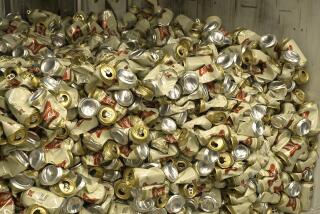Soft-Drink Giant Coca-Cola Is Downing a Case of Criticism in Europe
PARIS â One French guest at President Jacques Chiracâs Bastille Day garden party this month was plainly aghast. âCoke at the Elysee Palace?â he said, eyeing the bottles of bubbly dark liquid on the buffet table. âIf it were up to me, Iâd throw them out until they serve French wine at the White House.â
No American company carries heavier cultural baggage abroad than Coca-Cola Co., proprietor of the worldâs best-known brand.
The subject of nearly a dozen investigations in a decade across Europe, Coke--which was served at the Eiffel Tower in the 1920s--has always attracted intense scrutiny here. In 1949, communists in Paris claimed the U.S. State Department was behind an effort to foist Coke on the French.
This summer, the Atlanta-based soft-drink giant has been hit with a European double whammy: the largest recall in its history, and raids by European Commission investigators probing allegations of anti-competitive practices.
Coming in the midst of a nasty food fight over agricultural exports between the 15-nation European Union and the United States, Cokeâs problems have got some wondering whether the $19-billion-a-year enterprise is being singled out on this side of the Atlantic because itâs virtually synonymous with American capitalism and consumerism.
âWe feel thereâs a piling-on going on with respect to the Coca-Cola Co.,â one Atlanta executive said in a telephone interview. âThis may or may not have to do with sanctions. But we definitely feel weâve become a target.â
The company is working overtime to woo back customers who may have been scared away when more than 100 people in Belgium and France complained of stomach pains, nausea and other symptoms after drinking Coke products.
Coca-Cola Chairman M. Douglas Ivester promised to buy everybody in the country--all 10 million--a Coke. One weekend this month, 5,000 runners stuffed 4 million mailboxes with coupons good for free Cokes.
Next, Coke plans to truck in ice from the North Pole and 20,000 tons of sand to 10 Belgian towns to throw âbeach partiesâ far from the seaside. Coke figures a third of the men, women and children in Belgium should be handed a Coke to sample this summer.
âWeâre focused on the rebuilding effort, and to doing whatever it takes to rebuild the trust and confidence of the Belgian consumer,â said Jennifer McCollum, communications manager for the companyâs 49-nation Greater Europe Group, from Cokeâs offices in Brussels.
In part because of its troubles in Europe, which generates a full fifth of its worldwide sales, Cokeâs profit fell 21% in the second quarter from a year earlier, to $942 million. Executives in Atlanta estimate that a quarter of the profit decline was caused by the recall of 17 million cases, estimated to have cost Coke more than $100 million.
Over the last 10 years, Coca-Cola has been investigated at least 10 times by authorities in one European nation or another. In France, Cokeâs bid to buy Orangina, a local brand of orange soda, was nixed by government officials; a plan to acquire the soft-drinks business of Cadbury-Schweppes in most of Western Europe was blocked by European Union antitrust officials and had to be dramatically scaled down.
The respected London-based Economist magazine recently accused Coke of acting âarrogantlyâ toward European customers and regulators alike, and many observers found Coke markedly slow to react to the consumer scare.
But Martin Romm of Credit Suisse First Boston, a New York-based analyst, believes the company makes a convenient scapegoat when Western Europe has a trade quarrel with the United States.
âIt will never be admitted by any member of the European Commission, but the fact is, Coke typifies American business and becomes a target when you get into economic circumstances that can get nasty,â Romm said.
The conservative Paris daily Le Figaro, rarely an ally of American business, also wondered in print this month whether Cokeâs latest travails with the European Commission are not in fact a ânew stageâ in the hottest transatlantic trade dispute of the moment, over American hormone-fed beef.
Stefan Rating, spokesman for Brussels-based EC, the executive arm of the European Union, called such suspicions and speculation âabsolute rubbish.â
âAny company, European or American, that did what we suspect Coke of doing would run afoul of the European Commission regulatory mechanism,â Rating said Thursday, citing recent EC actions against British Airways and Belgian brewer Interbrew.
Still, some found the latest action against Coke a bit melodramatic.
In dawn raids spread over two days last week, EC investigators entered the offices of Coca-Cola or its leading bottlers in Berlin, Copenhagen, Vienna and London, and carried away copies of 10,000 pages of documents for closer scrutiny, Rating said.
âJudging from the way the commission is handling its latest high-profile case--against Coca-Cola--you would think the bottler was an international terrorist conspiracy instead of a soft-drink vendor,â the Wall Street Journal Europe, a vigorous critic of the European Union administration, contended in an editorial Tuesday.
European Commissioner Karel van Miert, in charge of antitrust cases, said his staff acted out of suspicion that Coke was secretly paying supermarkets and other retailers to pull competing soft drinks from the shelves and to carry a full range of Coca-Cola products such as Fanta and Sprite. Stores that met sales targets set by Coke were allegedly paid lucrative bonuses.
The alleged actions are a variation on a common but murky industry practice--the paying of âslotting feesâ to large supermarket chains for shelf space--that can veer into illegality but is hard to prove.
Van Miert was careful to note that the allegations have yet to be proved, but added: âLet me make it quite clear that a dominant company on any market cannot indirectly bully competitors by pushing its customers to buy less of the competitorsâ products.â
Coke already sells enough fizzy drinks to claim a 55% share of the market in Germany and 59% in France, and it wants more.
Two competitors, long-standing rival Pepsi and upstart Virgin Cola, have acknowledged filing a complaint with European authorities about Cokeâs business practices--similar to actions they have taken against Coke elsewhere, including the United States.
(Pepsi itself was the target of a recent two-year U.S. investigation for the same practice involving its Frito-Lay snack division. No charges were brought.)
âPepsi has stepped up its legal efforts against Coke in a number of markets,â John Sicher, editor and publisher of Beverage Digest, a trade publication, told Associated Press. âWhat is happening right now [in Europe] is not just one isolated circumstance.â
If found guilty, Coca-Cola could be fined as much as $2 billion.
Rating said EC officials will need months to pore over the boxes of photocopies they carried away from Coke offices to determine whether they have conclusive evidence for their case.
More to Read
Inside the business of entertainment
The Wide Shot brings you news, analysis and insights on everything from streaming wars to production â and what it all means for the future.
You may occasionally receive promotional content from the Los Angeles Times.










